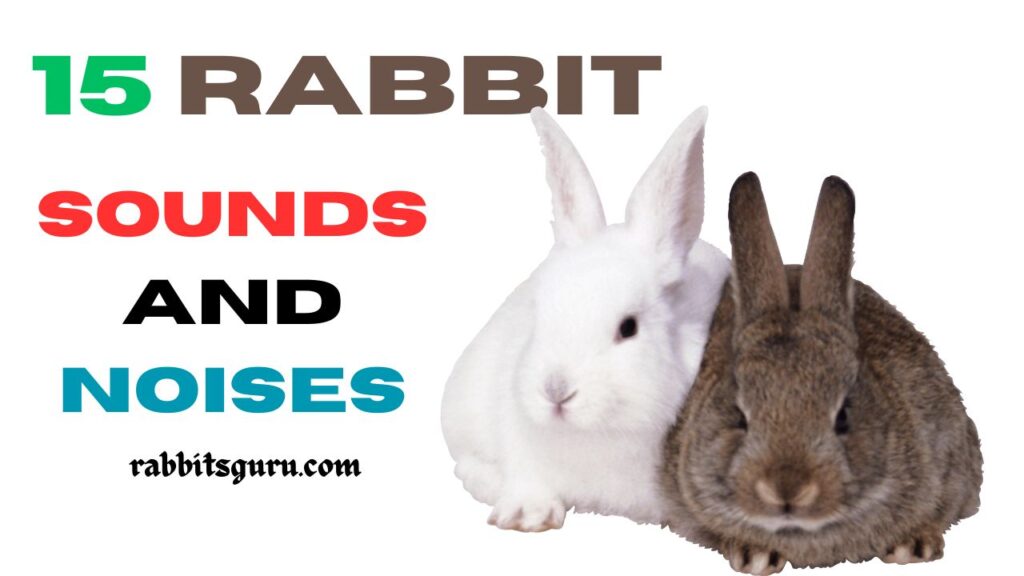15 Rabbit Sounds and Noises: What Do They Mean?
Being a pet rabbit is very quiet. They do not meow at you in frustration like dogs or growl like dogs. Although their primary means of communication is body language, rabbits can also make some very quiet sounds that can give us some insight into their emotional state.
Rabbit sounds, such as clucking, teeth grinding, and purring, can reveal a lot about a rabbit’s emotions. Rabbits use their body language and soft sounds to communicate with each other.
The more time you spend with Sasha, the deeper you get to know Sasha if you can distinguish between their speaking styles and voices.

How does a rabbit make noises?
Almost all rabbit vocalizations are very quiet. To understand what your rabbit is saying you must pay close attention and spend some time learning the differences between all the different but similar sounds to learn to read your rabbit’s body language and understand what he is trying to tell you. Learn to read these sounds.
Rabbits also make loud noises to express their anger or irritation at you or anything around them.The reason behind this louder sound is that your rabbit may also be afraid.
15 Sounds Rabbits Make and What They Mean

1. Brushing the teeth
Purring teeth in rabbits is similar to the appearance of purring teeth, although not quite as common as in cats, but the meaning is the same.When it is happy and relaxed, its teeth are gently gnashing while being petted.
When you pet your rabbit, you can feel his head cut off, sometimes it’s hard to do unless you put your face very close to him. Additionally, you can see your rabbit’s muzzle shaking slightly as it settles in the teeth area.
2. To scream
Hearing a rabbit scream is strange. Many people who have rabbits have never heard their pet scream. It sounds more like a scream but it is a sign that your rabbit is hurt or injured. You may even hear them scream when they seriously hurt themselves. Check the reason behind your sister’s voice.
3. Sigh
Rabbits and other animals act similarly when breathing becomes difficult.
Your paws can cause breathing difficulties. Colds and other respiratory infections are the most frequent causes. These usually go away on their own. See a vet. Stress and a compromised immune system can also cause wheezing.
It’s also possible that your overweight dog is overweight. Is and will pass. Obstructed by excess fat. Remember that a cane and a litter box are not the same thing. Your rabbit will only drop a single satisfied cane, but your pet will continue to wheeze and show other signs of distress.
4. Knock
It is true that rabbits make clucking noises, sometimes called hiccup. Sometimes it sounds like hiccup. They are quiet and low-pitched. Additionally, rabbits are likely to snuggle while sleeping or dreaming while sitting on your lap.
You may hear them click as they interact with their cage so they may knock. This cute sound my bunnies make while nursing their young also shows they are content.
5. Screaming can be heard
You may shudder when your rabbit screams because there are two reasons: firstly, it sounds like a frightened child to a stranger, but secondly, they don’t scream unless they are in danger of being killed or chased by a hunter, but the rabbit creates when it is very upset. Another sound is that of violence. Some medical conditions, such as bleeding disorders, result in pain that can lead to screaming.
A rabbit can scream if it is scared for its life. For mercy when your bunny screams and can’t run away. Rabbit’s king kaya koi nahi can be very annoying and cannot be mistaken for any other rabbit’s sound.
6. Foot Stomping
When rabbits startle or make loud noises on their hind legs, it is possible that your rabbit has heard a strange noise and thinks that a predator is approaching.
Stomping is a warning sign that something terrible is about to happen. This can happen all the time in solitary rabbits. You want to know that danger is approaching. Also, other rabbits find their feet when disturbed. There may be a desire to catch a toy.
But not every rabbit touches its feet, their personality will dictate everything, some are stubborn and wait longer, some who are more relaxed may not even try.
7. Humming
When a rabbit is happy with its current situation, it hums something like when you are relaxing in the garden, sometimes they walk around the house, bunnies hum when they are playing various games, they can also hum.
As with every rabbit wedding, most party owners associate a prolific banshee chasing their sweethearts, which can be difficult to hum.
8. A purring sound may occur
Sasha’s purr is similar to a cat’s, but cats use their purr.
The low-pitched purring from snakes can often have a rumbling quality to it with distant helicopter sounds if you will. Your rabbit will make purring sounds when it’s content and very comfortable.You might hear them come and go when you’re cuddling comfortably on your lap, but they’ll be replaced by other happy indicators.
9. Crying or whispering
If your rabbit doesn’t like to be touched, they will whisper or cry in the cage so you can hear them more clearly than if someone else kept the cage with them.
Whimper suggests that he is not too happy with their current situation which could suggest that the pregnant bunny is uncomfortable with the approach of the buck.
Also, bunnies whisper when they are scared, so your bunny may growl if something runs and scares them. In addition, it is easy to hear a muffled whisper when a stranger tries to water or touch it.
10. Hissing
A growl is more common than a hiss. If a predator doesn’t react to a decoy, your voice will have to find another way to attract attention. Hissing makes the desired sound.
A violent noise may accompany other violent acts. Your rabbit may hiss and snarl at the same time to get you to go, it may even attack you to get away from intruding bunnies.
11. This is it
This is a very common occurrence in snakes, they will chatter and repeat pauses lasting only a minute or thirty seconds at a time, especially after the snakes have run and bounded around.
Most of the time there is no problem with sowmya hechiki but if your bunny is getting it regularly see a vet first to make sure there are no underlying medical problems.
12. Teeth mesh
Rabbits also make a distinct sound that sounds a lot like purring but means the exact opposite. Your rabbit is indicating that they are unhappy or upset when they gnash their teeth very loudly. This is less common and often occurs when your pup has a dental condition such as an overgrown tooth.
This noise is loud and annoying compared to a quiet noise and your rabbit’s body language can tell that they are uncomfortable. They may be sitting in an awkward hunched position, have little energy and a low appetite.
13. Snoring
It’s true that rabbits snore when I first heard my Sasha snoring excessively in her sleep I was a little concerned as I suspected she was having breathing problems however I found out that rabbits do make some noises when they sleep.
Fortunately, rabbit snoring is not as annoying as humans, it makes a very gentle sound that is a bit squeaky but occasionally you will also hear a bunny snoring. Some health signs to watch for include your rabbit’s snoring, runny eyes, runny nose, or frequent sneezing.See a veterinarian knowledgeable about rabbits.
Also Read: Can Rabbits Eat Kiwi?
FAQs
Q1. What does a rabbit mean when it screams?
Ans: Purring indicates that the rabbit is content and happy.
Q2. Why do rabbits kick their feet?
Ans: Thumping is a warning of danger or distress.
Q3. What does a rabbit purr mean?
Ans: Growling usually indicates annoyance or aggression
Q4. Why do rabbits scream?
Ans: Chimpanzees usually indicate fear or pain.
